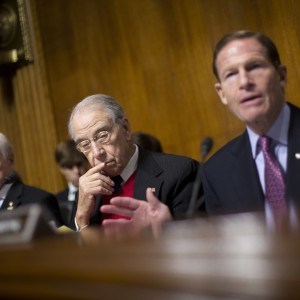Connecticut Democratic Sen. Richard Blumenthal said Wednesday President Barack Obama’s pick to replace Justice Antonin Scalia, who died Saturday, deserves a Senate hearing within 100 days of being submitted — and an up-or-down vote within 237 days.
Sen. Majority Leader Mitch McConnell, R-Ky., meanwhile, hasn’t budged from his vow that Senate confirmation of a replacement for Supreme Court Justice Antonin Scalia is off the table until after Obama leaves office in January, setting up a possible 11-month standoff with the White House.
Blumenthal, who joined N.Y. Sen. Charles E. Schumer and the leaders of a coalition of progressive groups Wednesday in criticizing GOP “obstructionism,” predicted public outrage would force Republicans to reconsider.
“We are not saying the president’s nominee should be rubber-stamped,” Blumenthal said. “There is clear precedent with moving ahead with the president’s nominee. Every nominee within the last 30 years has received a hearing and a vote within 100 days, the longest was Clarence Thomas, 99 days. No seat has remained vacant longer than 237 days. I think those time periods are the proper parameters for what should, on the outside and at the longest, should be the time taken.”
Blumenthal offered his timeline as he, Schumer and leaders from MoveOn.org and civil rights group Color of Change announced a petition drive aimed at convincing Republicans that stalling on the Supreme Court pick will cost them at the ballot box next fall.
Schumer, meanwhile, has become a focus of pushback on the right after critics resurfaced a 2007 video in which he urges Democrats to oppose any nominees from then-lame-duck President George W. Bush. But on Wednesday the senator expected to take over next year as the Senate Democrats’ leader after Harry Reid retires sounded confident: “Senator McConnell will have to back off. I believe we’ll get hearings and a vote.”
Republicans have accused both Schumer and Obama of hypocrisy when it comes to the Senate’s handling of Supreme Court nominees submitted by a president of the opposing party.
Comparing 2007 to today is “apples to oranges,” Schumer said, insisting he did not suggest nine years ago that the Senate judicial approval process be halted —only that Democratic senators vote down any Bush appointee.
Schumer also posted an explanation on the Medium.com website, writing: “What I said in the speech given in 2007 is simple: Democrats, after a hearing, should entertain voting no if the nominee is out of the mainstream and tries to cover that fact up. There was no hint anywhere in the speech that there shouldn’t be hearings or a vote.”
The administration also struggled Wednesday to explain Obama’s political history.
At the White House, where the president has said he intends to submit an “indisputably” qualified nominee and expects the Senate to “do their job,” spokesman Josh Earnest on Wednesday said Obama now regrets his support, as a young senator, for an unsuccessful 2006 filibuster by Senate Democrats against the confirmation of Supreme Court Justice Samuel Alito.
“What the president regrets is that Senate Democrats didn’t focus more on making an effective public case about those substantive objections,” Earnest said. “Instead, some Democrats engaged in a process of throwing sand in the gears of the confirmation process. And that’s an approach that the president regrets.”
Schumer and Blumenthal said Democrats are counting on progressives to create a grassroots movement to force Republicans to yield, but conservative activist Carrie Severino, a former clerk to Justice Clarence Thomas, now chief counsel of the Judicial Crisis Network, said the Supreme Court traditionally generates more energy in the Republican base.
“This upcoming election — people have a unique amount of frustration and anger with, really, both parties and with the way things are done in Washington. It’s a real populist movement that’s going on,” she told InsideSources. “This is exactly the kind of decision where people would like to see their voices being heard — not just more of the same.
“This isn’t even about a particular nominee at this particular point,” she said. “This is about the process, and whether this is something that should be decided by the people or by President Obama.”
Some Republicans, including Judiciary Chairman Charles Grassley, R-Iowa, indicated Wednesday more willingness to hold hearings on a potential Obama pick.
Severino said holding hearings and a vote would be destructive and a disservice to whomever the president nominates if Republicans, who control 54 of the 100 seats in the Senate, are committed to waiting for the next president.
Obama, who could theoretically make a recess appointment to fill Scalia’s seat this week while the Senate is out of town, has said he wants his as-yet-unnamed nominee to go through the normal process. But Severino had some advice for Senate Republicans:
“If I were a Republican senator, I would not vote to recess again between now and January.”

